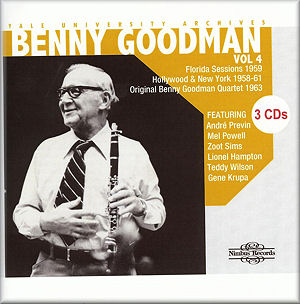CD 1
1. Sleep
2. Sometimes I'm Happy
3. Rosetta
4. Dark Shadows
5. Tea For Two
6. Deacon And The Elder
7. I Want To Be Happy
8. Someone To Watch Over Me
9. Ten-Bone
10. Sweet Miss
11. Time On My Hands
12. Splanky
13. The Best Thing For You
CD 2
1. It's All Right With Me
2. Willow Weep For Me
3. My Little Grass Shack
4. Too Many Tears
5. Easy To Love
6. Who?
7. Sweet Leilani
8. Song of the Islands
9. The Moon of Manakoora
10. On the Beach at Waikiki
11. Blue Hawaii
12. Bei Mir Bist Du Schon
13. Gershwin Medley
14. Rodgers and Hart Medley
CD 3
1. Dearest
2. Together
3. Who Cares?
4. September Song
5. Just One of Those Things
6. Love Sends a Little Gift
7. Oh, Gee! Oh, Joy!
8. Bernie's Tune
9. East of the Sun
10. Four Once More
11. Liza
12. But Not For Me
13. Somebody Loves Me
14. It's All Right With Me
Benny Goodman (clarinet) with
CD 1 - Flip Phillips (tenor saxophone); Bill Harris (trombone); Marty
Harris (piano); Leo Robinson (guitar); Al Simi (bass) and Bob Binnix
(drums)
CD 2 – Bands featuring amongst others; Zoot Sims (tenor saxophone);
André Previn (piano); Mel Powell (piano)
CD 3 – Teddy Wilson (piano); Lionel Hampton (vibes); Gene Krupa (drums)
This 3 CD set is volume four in the Goodman Yale University Archives
series. Each disc pursues a different agenda. The first is devoted
to the August 1959 sessions in Miami in which Goodman joined Flip
Phillips and Bill Harris in a three man front line. The second disc
traces Hollywood and New York sessions during 1959 and 1961 in a variety
of settings and with an interesting array of collaborators. The final
disc concerns itself with the 1963 reunion of the BG Quartet and all
that that entailed.
The first disc features thirteen outstanding selections. Apparently
Phillips had a calming effect on Goodman, and with Harris’s adroit
musicianship and a good rhythm section the music making was sophisticated,
and unflaggingly enjoyable. The charts are full of simple but effective
ploys – breaks, backings, harmonies, tempo decisions, and they all
coincide in this marvellous session. Sleep gets a rather Benny
Carter inspired arrangement and with Phillips’s Lester Young influenced
tone to the fore in such as Dark Shadows we are assured of
some plangent soloing. It’s good to hear the Nat Adderley gospel swinger
Deacon and the Elder. The element of ‘Old Wine, New Bottles’
certainly infiltrates I Want To Be Happy with its Goodman stop
chorus, just as the Ellington small band ethos permeates Flip Phillips’s
Ten-Bone. Here the jump-band, riff-based melos works like a
dream. Goodman’s angular but finely swinging playing illuminates Sweet
Miss and Basie-itis is at a premium in Neal Hefti’s Splanky.
The booming bass of Al Simi, and the fine conversational Phillips
and Harris solos are allied to Goodman’s lower register work, Noone-like
when soaring. This is a terrifically impressive date.
The 1958-61 tracks that inhabit the second disc offer other, though
perhaps less consistent pleasures. André Previn can be heard in three
tracks, though briefly in solo, albeit Barney Kessel takes a good
solo in Who. Other tracks team Goodman with his old colleague
Lou McGarity and newer colleagues such as Bernie Privin and Toots
Mondello, and Zoot Sims. Privin’s big fat tone can be heard to advantage
in My Little Grass Shack. Goodman refused to allow the Hawaiian
tracks to be issued, though they’re not so bad. Better of course is
the reprise of his glory days in the shape of Bei Mir Bist Du Schon
with the still youthful sounding Martha Tilton. To end we have
the superior trio sound of Goodman, pianist Mel Powell and drummer
Roy Burnes in a series of medleys. Powell was always a stimulating
companion and the threesome cooked up some neat tempo changes in these
Gershwin and Rodgers and Hart evergreens.
The trio sides lead on nicely to the last disc, which reunites the
famous BG Quartet for a series of 1963 recordings. This was the only
such time they reunited. I happen to find Krupa’s bass drum somewhat
annoying but compensations are there in profusion. Wilson is impeccable
and swinging, as ever – his playing in Together is a particular
delight – and Hampton is a tower of strength, not least on September
Song. Goodman laps this all up and his fluid, flexibly metered
playing on Just One of Those Things shows him in lyrically
unfettered form, though I’m not keen on the fade out ending. There
is some larking about on Four Once More in which Wilson sets
up a Boogie rhythm but the whole thing breaks down – an interesting
rehearsal snippet amidst the other finished songs.
It ends a three CD of variety, interest and enjoyment.
Jonathan Woolf
See and additional review by Don Mather.
